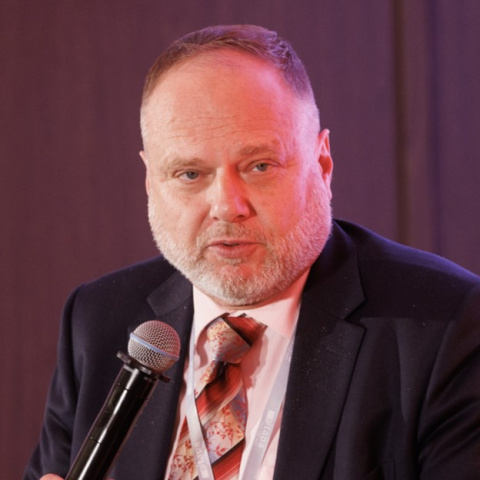
Pavol Frič
Vice President of IT Association of Slovakia for eGovernment. In 1986, he finished his university studies at the Department of Computers of the Faculty of Electrical Engineering, SVŠT in Bratislava. After completing his studies, he continued to work at the university and in 1995 defended his candidate's dissertation in the field of artificial intelligence. He developed several new subjects and actively lectured in the field of artificial intelligence and software engineering. In 1995, he began to devote himself fully to work at DITEC. He worked as the director of the Information Systems Division. In 2000, he was appointed to the position of Vice President for Strategy. In this position, he manages the company's development projects and coordinates the cooperation of subsidiaries. His main areas of interest are e-commerce, e-government, security and PKI. He actively participates in solving key projects in the field of building e-Government. He participated in the introduction of the ECDL program in the Slovak Republic and actively participates in the preparation of legislation and standardization in the field of electronic signatures and building e-Government. He passes on his experience in building eGovernment and using the necessary technologies to students at FIIT STU and MFF STU. He became vice president of ITAS in June 2019 and again in 2021.
-
Discussion
-
DISCUSSION "Priority life situations"
-
DISCUSSION "Digital state 2027"
-
DISSCUSION "How Are We Building a Digital State?"
-
Digital transformation of public administration - what to expect from it
-
DISCUSSION "Life Situations 3.0"
The end of the era of traditional bureaucracy? Mária Terézia left us a surprisingly advanced administration for its time. Only now, after more than 250 years, is there a serious effort to change that will end an era of building a functional state. The change, when from the point of view of citizens, the borders between authorities are erased and a specific life situation is solved. Will this attempt succeed? Will it be possible to overcome departmentalism, the strict division of competences in favor of cooperation?
Ján Hargaš, MIRDI
Juraj Káčer, Ministry of Labour, Social Affairs and Family of the SR
Ľubor Illek, Slovensko.Digital
Pavol Frič, ITAS
VIDEOZÁZNAM -
DISCUSSION "Authentication in the Digital State"
The bottleneck of modern state services is authentication and authorization. It is not possible to radically increase the number of users of eGov services. Isn't authentication and authorization too rigid? It cannot be made more userfriendly?
Ladislav Kovár, MIRDI
Ján Bučkuliak, Government Office of the Slovak Republic
Pavol Frič, DITEC
Radovan Ako, CRIF
Patrik Plachý, RED HAT
Ľubor Illek, Slovensko.Digital
VIDEOZÁZNAM -
DISCUSSION on digital state services
-
DISCUSSION on life situations 2.0 topic
-
Guests
-
„New deal“ for eGovernment?
We currently have many ambitious eGovernment goals ahead of us. However, these can only be achieved through fair and effective cooperation between the state and the IT sector. In the presentation, we will point out some existing problems and outline the starting points for further direction. -
Do we do eGovernment for people?
The presentation analyzes the current history of building eGovernment in terms of meeting user expectations. It identifies the current state, problems and approaches that can be applied in the future. At the same time, it describes the challenges we will face in the immediate future in terms of building a friendly interface for the use of services. -
Discussion Round Table
Invited guests:
Marek Antal (MIRRRI), Pavel Karel (NASES), Vladimír Dzurilla (MV ČR), Emil Fitoš (ITAS), Pavol Frič (DITEC), Gabriel Lachmann (Slovensko.Digital), Rastislav Janota (NCKB SK-CERT), Pavol Miroššay (Slovensko IT) -
Annual Round Table
The presentation offers a complex view of the cohesion policy after 2021. In this contribution, you will learn more about the negotiations of the MFF, what kind of simplifications you may expect and what are the upcoming events in the negotiations. You will learn about the objectives and priorities of the European Commission and the possibilities for cumulative funding.
-
How to make eGovernment beneficial fo people
There are discussions about how to bring eGovernment solutions closer to people. The presentation will summarize what expectations are realistic and especially how to achieve these goals.
-
Discussion
-
Discussion
-
What we can do for a better eGovernment?
-
Annual round table
-
Discussion
